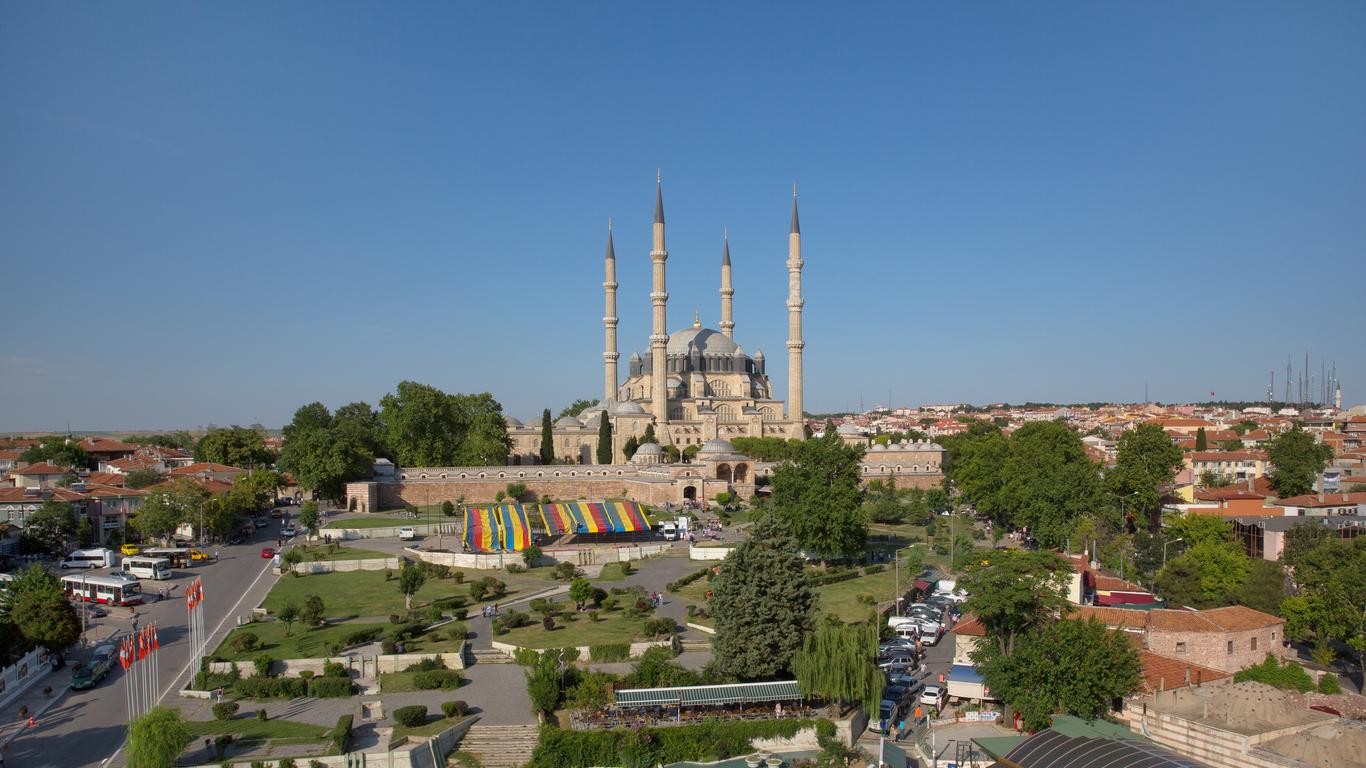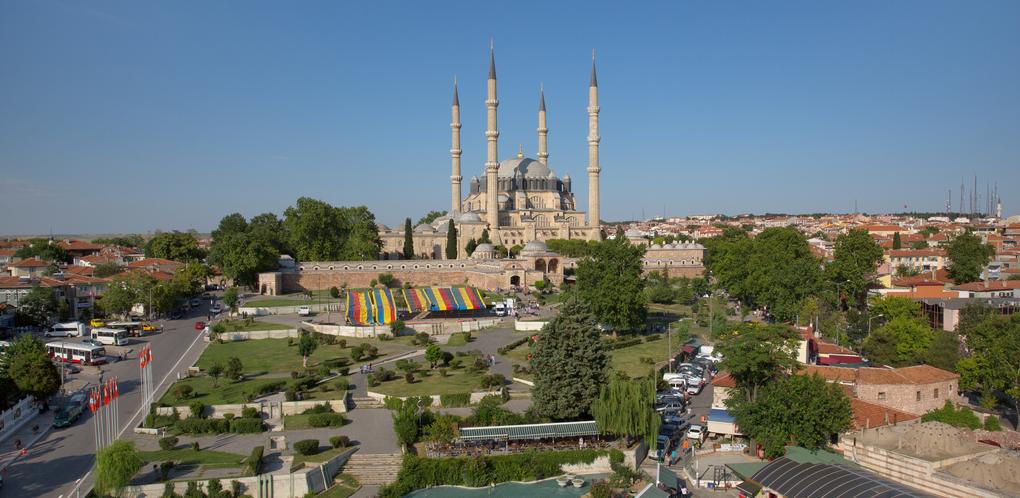
Edirne travel guide
Edirne Tourism | Edirne Guide
You're Going to Love Edirne
Located near the borders of Turkey, Greece, and Bulgaria, Edirne is an old city with a fascinating past as part of the Ottoman Empire. Today, it is a popular tourist spot for history and culture lovers, along with bargain hunters who frequent the local markets. A gateway to Asia with a European flair, you'll discover striking architecture and rich local cuisine.

Top 5 Reasons to Visit Edirne
1. The Beauty of Imperial Mosques
The city is renowned for its many gorgeous mosques, including the Imperial-era Selimiye Mosque, built in 1575, Eski Cami or Old Mosque, and Burmalı Cami or Serpent Mosque, which locals call Üç Şerefeli Mosque.
2. Shopping in Historic Bazaars
The Grand Bazaar of Edirne is a historic covered bazaar, located next to the Selimiye Mosque and designed by famed Turkish architect Mimar Sinan in 1569. It's just one of three such bazaars in the city where you'll find a wealth of locally produced and imported goods available.
3. Fascinating Museums
The city's history can be explored in museums such as the Edirne Turkish & Islamic Art Museum, housed in the Selimiye Mosque's courtyard house, and Edirne Archaeology and Ethnography Museum.
4. Thrace Wine Route
The area around the city is home to several highly regarded wineries, including the Arcadia Vineyards.
5. Delicious Cuisine
Set in the midst of lush agricultural lands, Edirne's dining scene is based on local meats and produce, and menus of Turkish favorites. The city is famous for Can Ciğer, a traditional fried liver dish.
What to do in Edirne
1. A Mark Of The Empire
It wouldn't be the Ottoman Empire without a proper and majestic mosque being erected to commemorate the rule. Commissioned by Sultan Selim II and built between 1569 and 1575, the Selimiye Mosque is simply a masterpiece to behold. Plan to spend an entire afternoon here and you won't be disappointed. Each of the four 233 foot towering minarets offers a different view of the city to all those up for the physical challenge of scaling the steps. For those who don't mind the view from the ground, there's still plenty to ensnare your senses: the brilliant and intricate mosaic tile work, the high vaulted ceilings and balconies within the main prayer room and a courtyard exterior as exquisitely designed as the inside.
2. For The Health Of History
Unlike a lone mosque, the Sultan Beyazıt II Mosque Complex is a whole slate of a social needs built around a religious center. The complex is an excellent example of Ottoman architectural design and includes a hostel for travellers, an asylum, a medical school and a teaching hospital. While many of the rooms and courtyards of the major buildings, including the mosque, are open to the public and free to wander through, you might consider spending some time at the designated "health museum", which now showcases the various Turkish medicinal practices.
3. Rest And Relaxation
On the outskirts of Erdine is Karaagac. Its weathered cobblestoned streets, hanging foliage, European street lamps and a mishmash collection of wooden outdoor furniture will put you in mind of a quaint little English or German town. But don't be fooled: the eats and drinks are all local and distinctly Turkish in nature. To get away from the hubbub of the city, visit Karaagac and sip some flavorful Turkish tea. For an added dose of culture and history, don't forget to visit the Lozan Monument and old railway station nearby.
4. An Afternoon At The Souk
It's not the Grand Bazaar of Istanbul but, as far as souks go, the Ali Pasha Bazaar gets by just fine and does not fail to live up to its name. Here, too, vendors jostle side by side in an enclosed, grand hall with large tiled ceilings, a space famous for bargain shopping. Shoes, accessories, textiles, electronics and even Turkish sweets are packaged in boxes, ready-to-go. So get your haggle on and name your price at the Ali Pasha Bazaar. Just make sure you have some extra room in your luggage.
5. Authentic Turkish Cuisine
Part of the Edirne experience is in its cuisine. Its position in the Thrace region, on the borders of Greece and Bulgaria, deeply influence its food culture. Pop into its finest restaurant, which is housed in a restored historic mansion, and sample the local cuisine. Start with a lentil soup and dig into bone-in chicken stew, rice pudding, fresh fruit and Turkish wine.
1. A Mark Of The Empire
It wouldn't be the Ottoman Empire without a proper and majestic mosque being erected to commemorate the rule. Commissioned by Sultan Selim II and built between 1569 and 1575, the Selimiye Mosque is simply a masterpiece to behold. Plan to spend an entire afternoon here and you won't be disappointed. Each of the four 233 foot towering minarets offers a different view of the city to all those up for the physical challenge of scaling the steps. For those who don't mind the view from the ground, there's still plenty to ensnare your senses: the brilliant and intricate mosaic tile work, the high vaulted ceilings and balconies within the main prayer room and a courtyard exterior as exquisitely designed as the inside.
2. For The Health Of History
Unlike a lone mosque, the Sultan Beyazıt II Mosque Complex is a whole slate of a social needs built around a religious center. The complex is an excellent example of Ottoman architectural design and includes a hostel for travellers, an asylum, a medical school and a teaching hospital. While many of the rooms and courtyards of the major buildings, including the mosque, are open to the public and free to wander through, you might consider spending some time at the designated "health museum", which now showcases the various Turkish medicinal practices.
3. Rest And Relaxation
On the outskirts of Erdine is Karaagac. Its weathered cobblestoned streets, hanging foliage, European street lamps and a mishmash collection of wooden outdoor furniture will put you in mind of a quaint little English or German town. But don't be fooled: the eats and drinks are all local and distinctly Turkish in nature. To get away from the hubbub of the city, visit Karaagac and sip some flavorful Turkish tea. For an added dose of culture and history, don't forget to visit the Lozan Monument and old railway station nearby.
4. An Afternoon At The Souk
It's not the Grand Bazaar of Istanbul but, as far as souks go, the Ali Pasha Bazaar gets by just fine and does not fail to live up to its name. Here, too, vendors jostle side by side in an enclosed, grand hall with large tiled ceilings, a space famous for bargain shopping. Shoes, accessories, textiles, electronics and even Turkish sweets are packaged in boxes, ready-to-go. So get your haggle on and name your price at the Ali Pasha Bazaar. Just make sure you have some extra room in your luggage.
5. Authentic Turkish Cuisine
Part of the Edirne experience is in its cuisine. Its position in the Thrace region, on the borders of Greece and Bulgaria, deeply influence its food culture. Pop into its finest restaurant, which is housed in a restored historic mansion, and sample the local cuisine. Start with a lentil soup and dig into bone-in chicken stew, rice pudding, fresh fruit and Turkish wine.
Where to Eat in Edirne
Choose traditional piliç or roast chicken at Balkan Piliç, where main dishes start at ₺5. For classic Turkish dishes such as tava ciğer, or fried calf's liver with red chilies, try Köfteci Osman, where main dishes start at ₺15.
When to visit Edirne
With winter temperatures that dip well below freezing, most tourists choose to visit during the summer from June to August, when temperatures average around 75 daily. The moderate spring and fall are also good alternatives.
How to Get to Edirne
Plane
Istanbul Atatürk Airport (IST) is the closest international airport to the city, at a distance of just under 145 miles. Train connections are available directly to Edirne starting at ₺33.
Train
There is daily train service between Kapikule, on the Bulgarian border, and Istanbul, with Edirne one of the stops along the way.
Car
Edirne is well connected to major centers throughout Turkey and into Europe by a network of highways.
Bus
There are several bus connections daily between Edirne and Istanbul.
Airports near Edirne
Airlines serving Edirne
Where to stay in Edirne
City Center - fanning out from a central square, the downtown area is where you will find the most famous trio of Selimiye, Üç Şerefeli, and Old Mosques, and the Old Quarter or Kaleiçi.
Popular Neighborhoods in Edirne
Sarayici - this area north of the city center is the former home of the sultans, along with their hunting grounds. The Justice Tower or Adalet Kasrı is the only completely intact portion of the old Imperial Palace.
Riverside - the leafy areas along the Meriç and Turca Rivers are home to cafes and restaurants with scenic views of the rivers and the elegant stone bridges built during the Ottoman era.
Where to stay in popular areas of Edirne
Most booked hotels in Edirne
How to Get Around Edirne
Public Transportation
A number of bus companies provide service through the city, including Edirne Otogar, with fares that vary by zone, starting at ₺1.50.
Taxi
Taxis are cheap and plentiful in the city, with fares starting at ₺20.
Car
Note that some areas within the older part of the city are car-free, but a car rental can be a good way of exploring the area. Compact rentals start at ₺90.
The Cost of Living in Edirne
Shopping Streets
Saraçlar caddesi, the main car-free shopping street of the city, is located near the Selimiye Mosque, offering a string of small shops and boutiques.
Groceries and Other
Kiler, Bim, and Kipa are three of the main supermarkets in the city. A quart of milk costs around ₺2.85 and a dozen eggs about ₺5.60.
